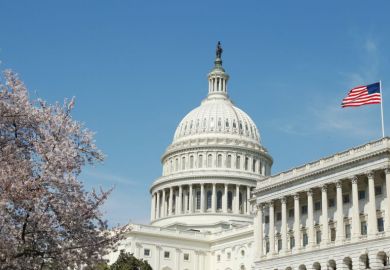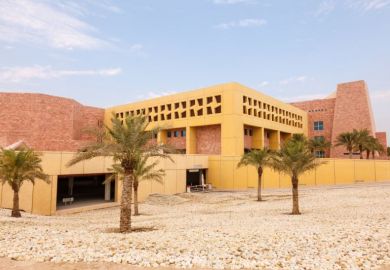Harvard University’s president, Lawrence Bacow, has joined an array of leading institutions protesting against the Trump administration’s immigration policies, saying that the government’s crackdown is harming a wide range of his students and faculty.
In a letter to top administration officials, Dr Bacow said he understood the legitimate need to protect US national security interests. “However, the increasing uncertainty around the systems in place to accomplish this task are driving anxiety and fear on our campuses and undermining the impact of our critical work,” Dr Bacow wrote to the US secretary of state, Michael Pompeo, and the acting secretary of homeland security, Kevin McAleenan.
In his letter, Dr Bacow said he was especially troubled by the administration’s higher scrutiny of foreign students and scholars, as well as some naturalised US citizens, from a small number of specific countries.
“Academic science is open and collaborative,” Dr Bacow told the Trump administration officials. “While we support appropriate measures to safeguard valuable intellectual property, national defence, and sensitive, emerging technologies, singling out one country and its citizens is incompatible with the culture and mission of higher education and our national ideals.”
Dr Bacow did not name specific countries, although China has been a chief target of the administration’s enforcement activities related to higher education and suspicions of espionage.
The letter brings Dr Bacow and Harvard into alignment with the leaders of several major US research institutions – including Stanford, Yale and Columbia universities; the University of California at Berkeley; the University of Michigan-Ann Arbor; and the Massachusetts Institute of Technology – that have issued such public appeals.
The university leaders have suggested that the administration’s zeal to crack down on intellectual property theft has not made a proper distinction between activities in corporate and national security realms, where secrecy is expected, and activities in university research settings, where sharing is the norm.
At least two institutions – Emory University and the MD Anderson Cancer Center in Houston – have fired ethnic Chinese scientists after having been asked by the National Institutes of Health about potential violations of its rules around funding, including on disclosure of foreign ties.
The US Department of Education, meanwhile, has begun writing to US universities that it suspects might not be in full compliance with a decades-old law requiring them to report foreign-sourced gifts and contracts.
In both cases, university leaders have questioned both the intent and the practical methods of complying with those government requests.
A Harvard spokesman did not respond to questions about whether the university had received such requests and, if so, how they have been handled.
Dr Bacow has been visiting Washington DC this week to meet with members of Congress to discuss immigration policies and other university-related concerns.
Register to continue
Why register?
- Registration is free and only takes a moment
- Once registered, you can read 3 articles a month
- Sign up for our newsletter
Subscribe
Or subscribe for unlimited access to:
- Unlimited access to news, views, insights & reviews
- Digital editions
- Digital access to THE’s university and college rankings analysis
Already registered or a current subscriber?







